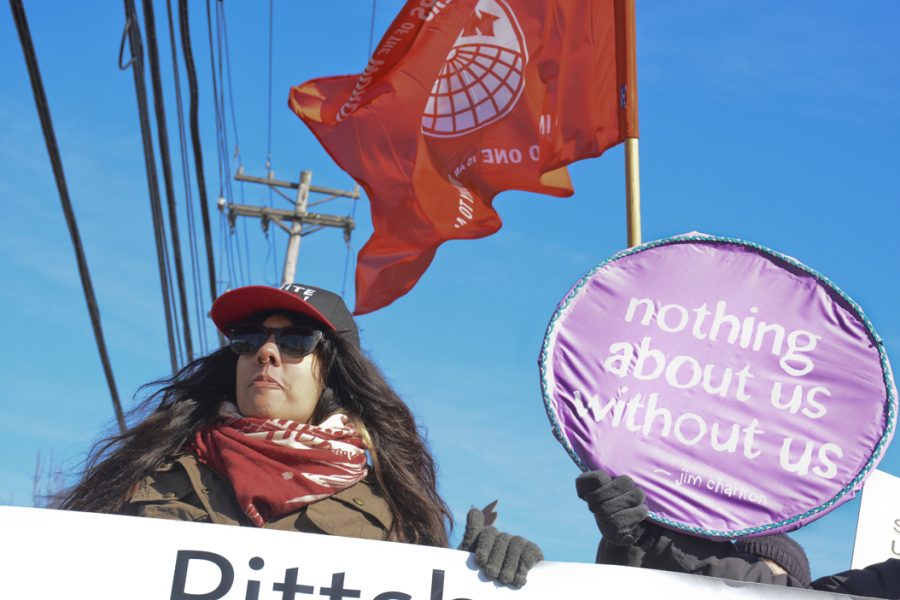Taking the trip from Denny Park, off Liberty Avenue, to Uber’s Advanced Technologies Center on Smallman Street in the Strip District would take one minute in an Uber.
But about 30 Pittsburghers marched the same route for a half hour Saturday afternoon to protest a swathe of issues they had with the ride-sharing company — its stance on immigration, worker’s rights and its tight relationship with Pittsburgh’s city government.
Uber’s Pittsburgh based detractors pointed to Uber CEO Travis Kalanick’s cooperation with President Donald Trump’s administration, lack of benefits for drivers and emails that show secretive deal-making between the city and the corporation as reasons for their anger.
Bracing against a cold wind, Chandana Cherukupalli, a community organizer with Pittsburghers for Public Transit, made a point to not limit the issues at stake in the protest.
“This is not just about Uber, this is not just about [Trump], this is about oppression,” Cherukupalli said.
Uber came under fire from progressives last weekend for allegedly breaking a taxi driver’s strike against the president’s executive order to ban refugees from entering the United States. Trump’s executive order resulted in federal immigration officials detaining U.S. legal residents at airports who were still citizens of one of seven restricted countries.
The multi-billion-dollar company dropped surge pricing — increasing trip fares when many people are making ride requests at the same time — near New York’s John F. Kennedy Airport last Saturday as protests raged against the president’s order. The move led protesters to believe Uber was trying to profit from the work stoppage.
Kalanick withdrew from the president’s council Feb. 2, while Uber defended dropping surge pricing as trying to help “people to be able to leave JFK at normal prices” in a statement. It was too late, however, to stop #deleteUber protests from popping up across the country, including the one on Saturday in Pittsburgh.
Christina Rostas, a 28-year-old North Side resident, showed up Saturday in solidarity with Uber’s immigrant drivers.
“It’s really sad Uber can’t come out and support their own workers,” Rostas said.
As for the committee, Rostas, said Kalanick shouldn’t have considered Trump’s offer given his campaign’s rhetoric against immigrants, Muslims and other marginalized groups.
As protesters gathered outside JFK, Dulles and other American airports during the early afternoon on Jan. 28, Kalanick posted on Facebook opposition to Trump’s executive order.
He also offered to compensate Uber drivers trapped overseas by the order “pro bono” for lost time. Since then, Uber also announced a $3 million legal defense fund for drivers.
Not all the criticism came from last weekend’s controversies. Speaking before the march, Helen Gerhardt, who runs a social justice blog and sits on the city’s Commission for Human Relations, criticized Uber for refusing to share data with the city of Pittsburgh on their autonomous vehicles safety record, as well as for ignoring “basic standard” for its drivers.
Gerhardt’s message of economic justice joined with Rostas’ concerns for immigrant’s rights to drive the march through the biting wind.
Uber drivers currently receive no insurance or retirement options. The company is also suing the city of Seattle to stop a new law that grants Uber and Lyft drivers collective bargaining rights.
While chanting “Pittsburgh ride-share, make it union, make it fair,” and “Hey Travis [Kalanick], you can’t hide, we can see your greedy side,” the marchers snaked through the Strip District.
As they reached the ride-share companies building on Smallman — a few curious onlookers recording the protest with their phones — three demonstrators hung a white banner from the 31st Street Bridge. Painted in blue and green, it read “Support workers + immigrants, delete Uber from PGH.”
While the causes of worker’s and immigrant’s rights appeared on placards and in the protest’s refrain, Gerhardt and some other attendees also worried that Uber had a unseemly influence on Pittsburgh’s own city government.
Citing the reports of the close relationship between Pittsburgh’s mayor and Uber’s CEO, Tom Conroy, a Port Authority bus driver and member of Amalgamated Transit Union Local 85, thought Peduto needed to quit “kowtowing” to Uber and show more transparency in his decision making.
In December 2016, PennLive reported that Peduto, as part of the city’s application for a competitive $50 million federal grant for infrastructure improvements, offered Uber access to the city’s busways in return for a $25 million investment in Pittsburgh’s infrastructure.
“These backroom deals are not the kind of deals a progressive city should make,” Conroy said.
The public-private partnerships that Peduto has championed concern Gerhardt. She said such deals are counter to Peduto’s 2013 campaign, in which he promised to clean up city politics.
Taking the situation as a whole, Gerhardt sees their protest as a way of holding the government accountable — a protest that might carry over to the ballot box if their demands aren’t met.
“If you want to be elected [mayor] again, you have to be responsive to our needs,” she said.



